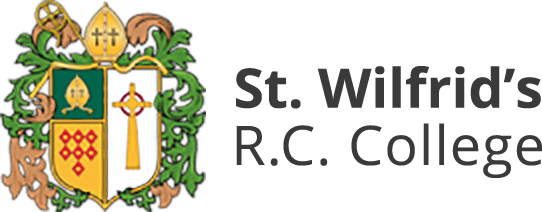The maths curriculum at St Wilfrid’s RC College is an ambitious, connected curriculum accessible to all our students right through from primary to the end of Year 13. Our structured and coherent curriculum promotes mathematical thinking, provides a challenge and helps all students reach their God given potential. St Wilfrid’s maths curriculum supports the whole school and BCCET vision of creating resilient and fluent mathematicians.
The fundamental idea behind our curriculum design is to support students to be able to perform more challenging tasks, we believe all students are capable mathematicians. Each cycle is made up of mathematical blocks of learning, within each of these blocks we then have small steps which are sequenced in order of difficulty and dependency.
Our curriculum has been designed to help our students gain a deeper understanding and make connections between fundamental mathematical concepts. However, we also recognise that just spending a significant amount of time on a topic doesn’t mean that all students will ‘master’ the concepts initially, we have the opportunity for connections to be developed and content revisited throughout our curriculum.
Spaced retrieval practice and students being exposed to mathematical concepts in various different contexts help them develop their understanding.
Key Stage Three
Our KS3 curriculum builds on the skills developed at KS2. We continue to develop our students’ abilities to reason and problem solve by integrating opportunities into classroom practice as much as possible in the order that is appropriate for the small step.
Through our curriculum, we aim to meet the needs and demands to prepare our students for KS4 and our ever- changing society by delivering a curriculum that will allow students to develop fluent knowledge, acquire and apply mathematical techniques to solve problems and draw mathematical conclusions.
Key Stage Four
In Year 10 our students begin to study for their GCSE examinations. Review steps are built into our Key Stage 3 (KS3) and Key Stage 4 (KS4) curriculum, at KS3 small steps that are identified as review steps would have been taught in KS2 and review steps in KS4 cover content that was taught in KS3.
Key Stage Five
We aim to develop the knowledge and passion for mathematics in all of our students. We encourage them to be problem-solvers and critical thinkers, taking the problems that are presented to them, breaking them down into their constituent parts, applying their knowledge and evaluating their solutions. We encourage students to discuss their approaches, using subject-specific vocabulary working in pairs and groups to see that there are usually many ways to tackle a problem. We hope to provide the knowledge and skills necessary not only for students to carry on their studies of mathematics post-18 but also to incorporate their new-found skills into other subjects and real-life scenarios. We would hope that students enjoy the challenges that mathematics brings and will continue to tackle problems in their daily life well beyond their years in formal education.
We recognise that mathematics is a hierarchical subject and have devised a program of study which allows knowledge acquired to then be applied to more complex theory. We must develop a firm grounding in the basics of algebraic manipulation, trigonometric identities and calculus before we embark on the more demanding topics, both within the domain of pure maths and applied maths. We encourage students to see the benefits of both pure mathematics and applied mathematics. Students should be able to model solutions to problems involving probabilities and data, as well as particles in motion and forces. This will hopefully inspire them to consider studies of more practical subjects based in the world of science and engineering.
Assessment and Homework
Our long term and medium term plans support one curriculum being taught to all students. All students study the same area of mathematics at the same time, with teachers using formative assessment to decide the depth of coverage for each topic. Block assessments and question level analysis are used to identify students areas of deep understanding and areas for development. Opportunities to address student misconceptions are built into lessons and assessments.
In Key Stage 3, higher steps identified in the medium term plans can be used to provide challenge for classes or individual students. From Year 10 the higher steps represent higher tier GCSE content and teachers can adapt the steps depending on their learners’ needs.
As our schemes demonstrate coherence of mathematical concepts that are developed each year, each small step can be adapted or built upon using the prior knowledge from previous small steps or challenge materials that support students developing a deeper conceptual understanding to transfer their knowledge to different mathematical concepts. KS3 cycle assessments are used holistically to identify if students have a surface, deep or transfer understanding of the taught curriculum.
In Key Stage 4, similar to KS3, block assessments are used to identify students understanding of mathematical concepts and their ability to transfer their knowledge. In Year 11 the use of past exam papers alongside block assessments are used to identify gaps in knowledge and the students ability to apply their knowledge to GCSE exam questions.
In maths students receive homework weekly on Sparx Maths. The homework is designed to support the curriculum, assessments are used by the class teacher to supplement the learning and understanding of misconceptions. Homework is designed to support students long term memory and the retrieval of knowledge, every other week students have tasks set on Sparx Maths that are based on fundamental prior knowledge.


